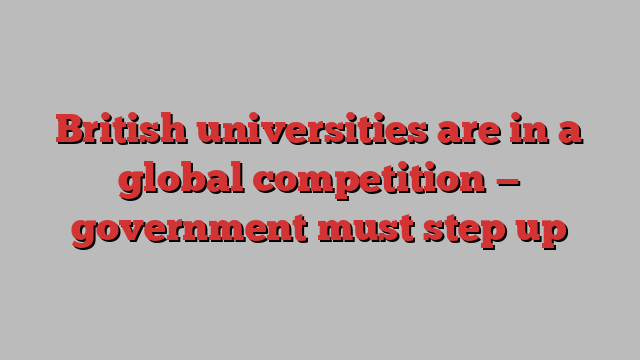
Unlock the Editor’s Digest for free
Roula Khalaf, Editor of the FT, selects her favourite stories in this weekly newsletter.
The writer is vice-chancellor of Cambridge University
It is 12 months since I arrived in Cambridge from the US as its new vice-chancellor. I came here without preconceptions about the UK’s infrastructure, economy and higher education sector. A year later, I now understand how this extraordinary place can help drive economic growth, innovation and productivity far beyond the city and its region.
Having worked at Princeton for over 30 years, I find the role of this university very different to that of its American Ivy League peers. Cambridge can contribute to the UK at a scale and with a significance that no single US university can match. It has a clear role to play as a national university, in the service of the country. With the need to stimulate economic growth at the heart of matters for whoever forms the next government, there are lessons and challenges from our experience.
The university’s national role includes, of course, both education and world-class research and expertise. Crucially, though, working in partnership with the private sector enables the innovation that creates wealth, jobs and tax receipts — while providing the medicines and technologies that improve our world.
But if we are to replicate these successes then both Cambridge and others — indeed the UK as a whole — need to improve how we translate scientific excellence into economic impact.
Cambridge already contributes around £30bn each year to the UK economy. This delivers benefits right across the country. It is Europe’s “unicorn” capital. Over the past three decades, 178 spinouts and more than 200 start-ups connected to it have emerged, including semiconductor giant Arm and the global life sciences firm Abcam.
This success is no accident. For years, Cambridge has done things differently. The university’s intellectual property management policy is liberal, providing greater freedom to our researchers and ensuring that they benefit from the commercialisation of their ideas. We have established science parks, venture capital funds and accelerator programmes. Cambridge is now a globally significant place to start and grow businesses.
The key question is: what will it take to expand on this success, both here and across the UK?
One answer to this question begins with access to talent from around the globe. The UK’s world-class universities are a huge draw, but they are currently facing significant headwinds in the form of rising immigration fees and restrictions.
We are told by the government that these changes will not prevent the brightest and most talented from coming to the UK. But they send a not-so-subtle message that foreigners are not welcome here. That alone is enough to deter talented students and academics, who are increasingly looking to the US, Asia, to other parts of Europe — our competitors for talent — for a warm welcome.
Indeed, for Cambridge to sustain the success of our innovation ecosystem we need the brightest and best from the UK and around the world to come here — especially as postgraduate research students — and for a better environment to support them.
Last year we asked the government for action in four policy areas: better infrastructure in the city and region; better access to talented, skilled people; stable research funding; and better access to capital, particularly in the scale-up phase of innovative new companies and products.
We need the government to also focus on delivering a favourable environment when it comes to patents, licences, spin-outs, industry collaborations, venture funding — not just on infrastructure, important though it is.
This kind of reform would enable big research-intensive universities to really take off. As it stands, the economic impact from our scientific excellence does not match the level and excitement of our research.
Britain is in a global competition; I know first-hand that what US universities spend on research in Boston and Silicon Valley is many times larger than what we see coming from our leading institutions in the UK. Despite this, Cambridge is ranked first globally for science intensity; we should aspire for it also to be the leader in translating research for economic impact. At the moment it is very good, but not yet great.
The lessons for incoming ministers set on solving this country’s productivity underperformance are there to be learnt from our example, in terms of the barriers we face and the support we lack. This is both a huge challenge and huge opportunity for whoever wins the general election.